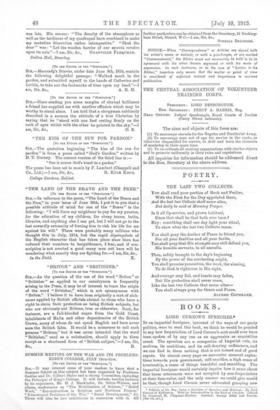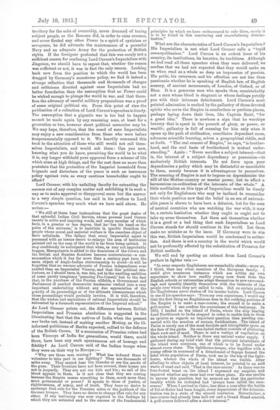BOOKS.
LORD CURZON'S SPEECHES.* Ti' an impartial foreigner, ignorant of the ways of our party politics, were to read this hook, we think he would be puzzled to say how Imperialism of Lord Curzon's sort could ever have been spoken of by any one as an aggressive or acquisitive creed. The speeches are a conspectus. of Imperial rule, its motives, its ambitions, and its self-denying ordinances, and we can find in them nothing that is not honest and of good repute. On almost every page we encounter reverent aspire• tions towards pure government, self-sacrifice, a high sense of trusteeship, a sense of things beautiful and ennobling. The impartial foreigner would certainly inquire how it came about that these utterances were not accepted by non-Imperialists at their face-value, and the only answer we could give would be that, though Lord Curzon never advocated grasping new
* Subjects of the Day: being a Selection or Speeches and 1Yriliegs. By Earl Curzon of Kedloeton. With an Introduction by the Earl of Cromer. Edited by Desmond M. Chniunnu-Ilubtoo, London : George Alloo and liuwio. [Ws, ed. net.]
territory for the sake of ownership, never dreamed of taxing subject people, as the Romans did, in order to raise revenue, and never flouted any other Power in a spirit of cynicism or arrogance, he did advocate the maintenance of a powerful Navy and an adequate Army for the protection of British
rights. If the foreigner protested that this was surely not a sufflOient reason for confusing Lord Curzon's Imperialism with Jingoism, we should have to repeat that, whether the reason
was sufficient or not, it was in fact the only reason. Looking back now from the position to which the world has been dragged by Germany's monstrous policy, we find it indeed a strange reflection that thousands and thousands of charges and criticisms directed against sane Imperialists had no better foundation than the assumption that no Power could be wicked enough to plunge the world in war, and that there- fore the advocacy of careful military preparations was a proof of some original political sin. From this point of view the publication of a collection of Lord Curzon's speeches is timely. The assumption that a gigantic war is too bad to happen cannot be made again by any reasoning man, at least for a generation or two, however short political memories may be. We may hope, therefore, that the creed of sane Imperialists may enjoy a new consideration from those who were before temperamentally opposed to it. We heartily commend this book to the attention of those who still would not call them- selves Imperialists, and would ask them : Can you now, knowing what you do know, perceiving the world to be what it is, any longer withhold your approval from a scheme of life which aims at high things, and for the rest does no more than postulate that the protection of the Imperial household from brigands and disturbers of the peace is such an insurance policy against ruin as every cautious householder ought to effect ?
Lord Cromer, with his unfailing faculty for extracting the essence out of any complex matter and exhibiting it in such a way as to make approval or disapproval seem but the answer to a very simple question, has said in his preface to Lord Curzon's speeches very much what we have said above. He writes :-
" We still at times hear insinuations that the great desire of that splendid Indian Civil Service, whose prowess Lord Curzon vaunts in noble and inspiring words, and every member of which feels, in a greater or less degree, that he has his hand on the pulse of the universe,' is to maintain in ignoble thraldom the people whose moral and material welfare is the ceaseless object of their solicitude. The fallacy that every Imperialist agent is possessed with an insane desire to enlarge the area of territories painted red on the map of the world is far from being extinct. It may confidently be anticipated that -when, as may not improbably happen, Mesopotamia is added to the dominions of the Crown and the British and Russian frontiers become conterminous—a con- summation which it has for more than a century past been the main object of Anglo-Indian statesmanship to avoid—it will be forgotten that no warmer advocate of Persian independence ever existed than an Imperialist Viceroy, and that this political mis- fortune, as I should term it, was due, not to the vaulting ambition of some purely imaginary 'prancing Pro-Consul,' but to the fact that, in the purchase of the Persian oilfields, a Government and Parliament of marked democratic tendencies rushed into a very important undertaking without any due appreciation of the gravity of its proceedings or of the ultimate consequences which those proceedings would probably involve. It is well, therefore, that the wishes and aspirations of rational Imperialists should be reiterated by a foremost representative of the Imperial school."
As Lord Cromer points out, the difference between British Imperialism and Prussian absolutism is suggested in the illuminating fact that the natives of India when the present war broke out, instead of making another Mutiny, as the ill-
informed politicians of Berlin expected, rallied to the defence of the British Crown. If a succession of Prussian rulers had been Viceroys of India for generations, would there, could there, have been any such spontaneous act of homage and fidelity? As Lord Curzon said of the Indian troops when they were on their way to Europe :—
" Why are these men coming P What has induced them to volunteer to take part in our fighting P They are thousands of miles away. They cannot hear the thunder or see the smoke of the guns. Their frontiers have not been crossed, their homes are not in jeopardy. They are not our kith and kin ; no call of the blood appeals to them. Is it not clear that they are coming because the Empire means something to them, much more than mere government or power ? It speaks to them of justice, of righteousness, of mercy, and of truth. They have no desire to exchange that rule for the Prussian sabre or the jackboot of the German trooper. They have no desire to change tfiat rule for any other. If any testimony was ever required to the feelings by which they are actuated and to the success of the fundamental
principles by which we have endeavoured to rule them, surely it is to be found in this convincing and overwhelming demons- tration."
What are the characteristics of Lord Curzon's Imperialism P His Imperialism is not what Lord Cromer calls a "tepid cosmopolitanism." Lord Curzon is an ardent lover of his country, its institutions, its beauties, its traditions. Although we had read all these speeches when they were delivered, we confess that we had not expected that they would make on us when read as a whole so deep an impression of passion. His pride, his reverence, and his affection are not less than passionate whether he is speaking of English law, of English scenery, of ancient monuments, of London, of Oxford, or of Eton. It is a generous man who speaks thus, unmistakably not a man whose blood is stagnant or whose feelings petrify you with their inhuman detachment. Lord Curzon's most pointed admiration is excited by the gallantry of those devoted spirits who serve the Empire in comfortless or perilous places, perhaps laying down their lives, like Captain Scott, "for a great idea." There is nowhere a sign that he worships bravery that is spent in the pursuit of glory, or power, or wealth; gallantry is full of meaning for him only when it opens up the path of civilization, conciliates dependent races, advances scientific learning, solves a. geographical riddle, and so forth. " The real cement of Empire," he says, "is brother- hood, and the real basis of brotherhood is mutual under- standing." Again : "Never sacrifice a subject interest--that is, the interest of a subject dependency or possession—to exclusively British interests. Do not force upon your dependencies a policy which may be distasteful or unsuitable to them, merely because it is advantageous to yourselves. The meaning of Empire is not to impose on dependencies the will of the Mother-country or master power, but to effect a harmonious co-ordination of the interests of the whole." A little meditation on this type of Imperialism would be timely not only for Englishmen who may be inclined to reconsider their whole position now that the belief in an era of unbreak- able peace is shown to have been a delusion, but for the men of neutral countries who are watching the war with, it may be, a certain hesitation whether they ought or ought not to take up arms themselves. Let them ask themselves whether it is a good or a bad thing that such Imperialism as Lord Curzon stands for should continue in the world. Let them make no mistake as to the issue. If Germany were to win this war, British Imperialism would be condemned to extinc- tion. And there is not a country in the world which would not be profoundly affected by the substitution of Prussian for British methods.
We will end by quoting an extract from Lord Cromer's preface in lighter vein
:-- "In some respects Englishmen are remarkably elastic—more so, I think, than any other members of the European family. I could give numerous instances which are within my own experience to show how readily young men fresh from the English schools or universities adapt themselves to new surround- ings and speedily identify themselves with the interests of the people over whom they are called to rule. But on certain points the Englishman never shakes off his insular habits. Lord Curzon in one of his speeches says: ' From my own experience, I would say that the first thing an Englishman does in the outlying portions of the Empire is to make a race-course; the second is to make a golf-course: I can confirm the correctness of this testimony. In 1872, I landed on the island of Perim, where the ship bearing Lord Northbrook to India stopped in order to enable him to form an opinion as regards an important question then pending con- nected with the erection of certain fortifications. The island of Perim is surely one of the most desolate and inhospitable spots on the face of the globe. Its sun-baked surface consists of glistening black rock and of sand. There is not a vestige of vegetation on the whole island. Neither is there any natural water supply. I gathered during my brief visit that the principal inhabitants of the island wore scorpions, one of which is to be found under almost every stone. The lighthouse-keeper, who together with a. young officer in command of a detachment of Sepoys formed the total white population of Perim, took me to the top of the light- house, whence the whole of the island was visible. After alluding to other objects of local interest, he pointed to an arid waste of sand and said, That is the race-course.. As there was no four-footed beast on the island I expressed my surprise, and inquired whether any races had over taken place. Ho was unable to answer this question, but he assured me that the particular locality which he indicated had 'always been called the race- course: When I arrived in Cairo, less than a year after the battle of Tel-el-Kebir had boon fought, every department of the Adminis- tration was in a state of the utmost confusion. Nevertheless, a race-course had already boon laid out and a Grand Stand erected. A golf-course followed after a short interval."



































 Previous page
Previous page